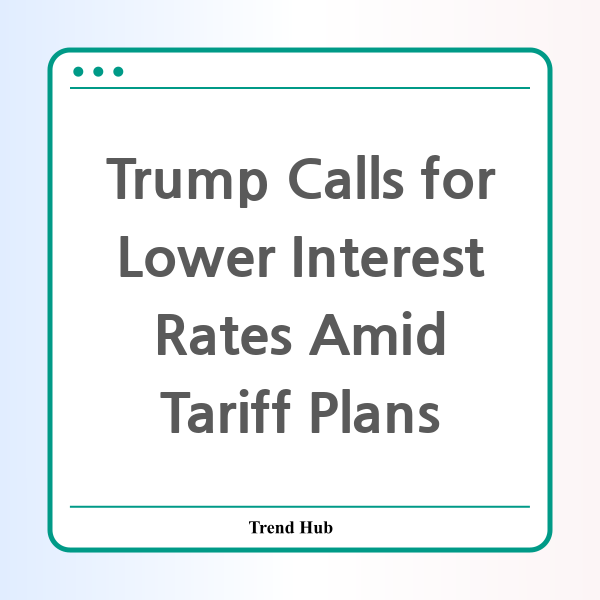* This website participates in the Amazon Affiliate Program and earns from qualifying purchases.

In a bold proclamation that echoes his prior economic strategies, former President Donald Trump recently took to social media to suggest that interest rates in the U.S. should be lowered. In a post on Truth Social, he stated, "Interest Rates should be lowered, something which would go hand in hand with upcoming Tariffs!!! Lets Rock and Roll, America!!!" This statement has reignited discussions around his economic policies and their implications for both the U.S. economy and international relations.
Trump's comments come at a time when tensions around trade policy are escalating, particularly with the announcement of new tariffs on various imports. The interplay between tariffs and interest rates can heavily influence market dynamics, consumer spending, and overall economic growth. Tariffs, which impose a tax on imported goods, are often intended to protect domestic industries. However, they can also lead to increased prices for consumers and retaliation from trading partners, potentially sparking a trade war.
The Federal Reserve, led by Chairman Jerome Powell, has remained cautious about interest rates, especially following February's inflation reports that exceeded expectations. With inflation appearing stubbornly high, the Fed has indicated that any rate cuts will be carefully evaluated. Market forecasts suggest that the Fed is unlikely to lessen rates in the near term, with a possible hold until mid-year before assessing further action.
Historically, Trump has advocated for lower interest rates, viewing them as a way to stimulate economic growth and facilitate borrowing. His administration frequently pushed for the Federal Reserve to adopt looser monetary policies, a strategy that has often been met with criticism due to the potential long-term impacts on inflation and fiscal stability.
As new tariffs loom, Trump's call for lower interest rates presents a complex dilemma for policymakers. While lower rates may provide short-term relief to consumers by making loans cheaper, they could also undermine the Fed's efforts to control inflation. Economists are divided on the viability of Trump's proposed linkage between tariffs and interest rates, with some arguing that such a strategy could create an unstable economic environment.
Moreover, as Trump seeks to rally support for his economic agenda, his administration faces scrutiny over its impact on global trade relationships, especially given that many European nations and trading partners are reassessing their positions in light of shifting U.S. policies. Concerns are rising that an aggressive approach to tariffs combined with demands for monetary easing could alienate allies and compromise international trade agreements.
In conclusion, as Trump continues to articulate his vision for America's economic future, the potential ramifications of his proposed policies on interest rates and tariffs will be closely monitored by economists, financial markets, and international governments. The interplay of these factors could set the stage for a tumultuous economic landscape, redefining America's position in global commerce.
* This website participates in the Amazon Affiliate Program and earns from qualifying purchases.